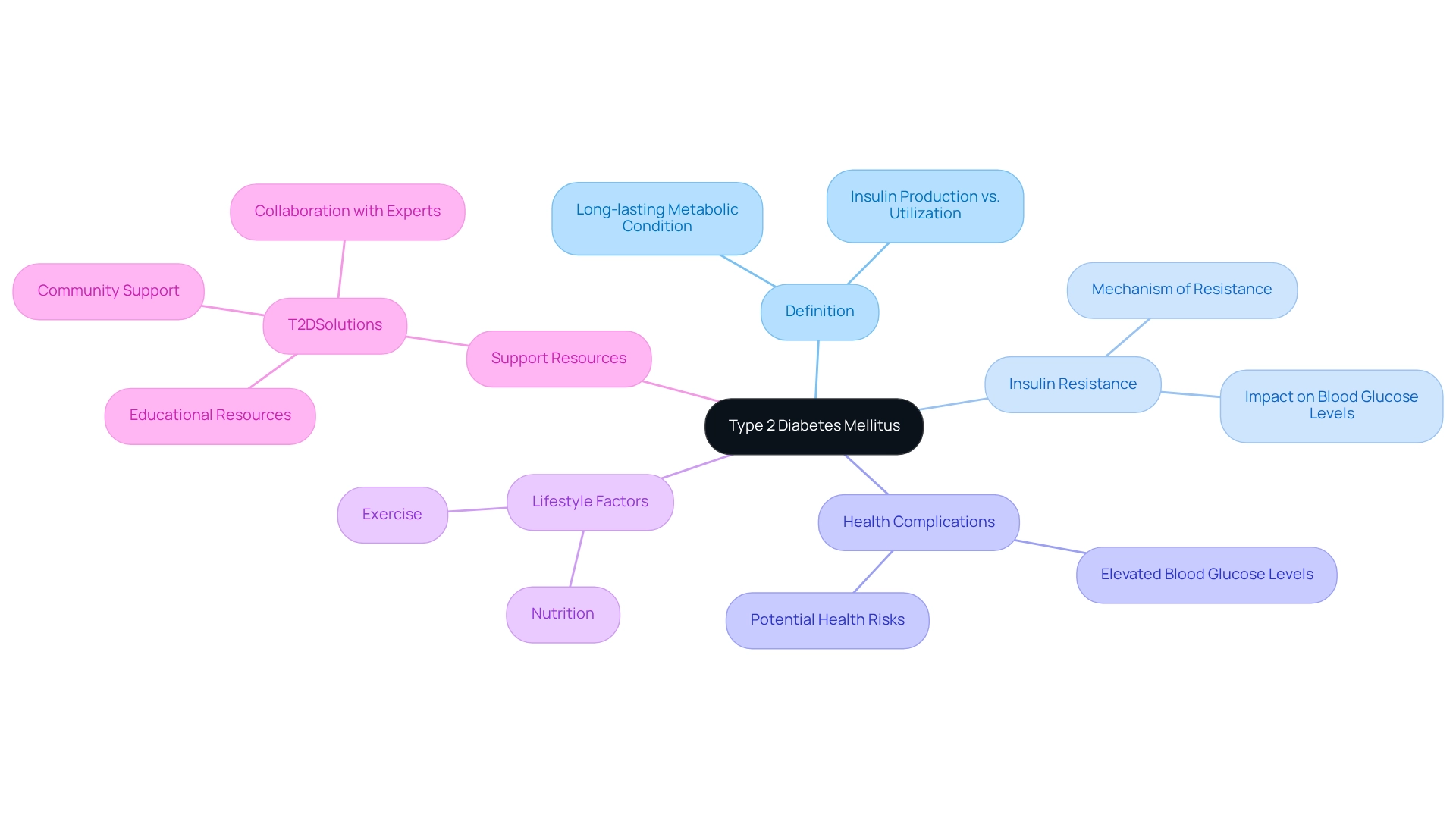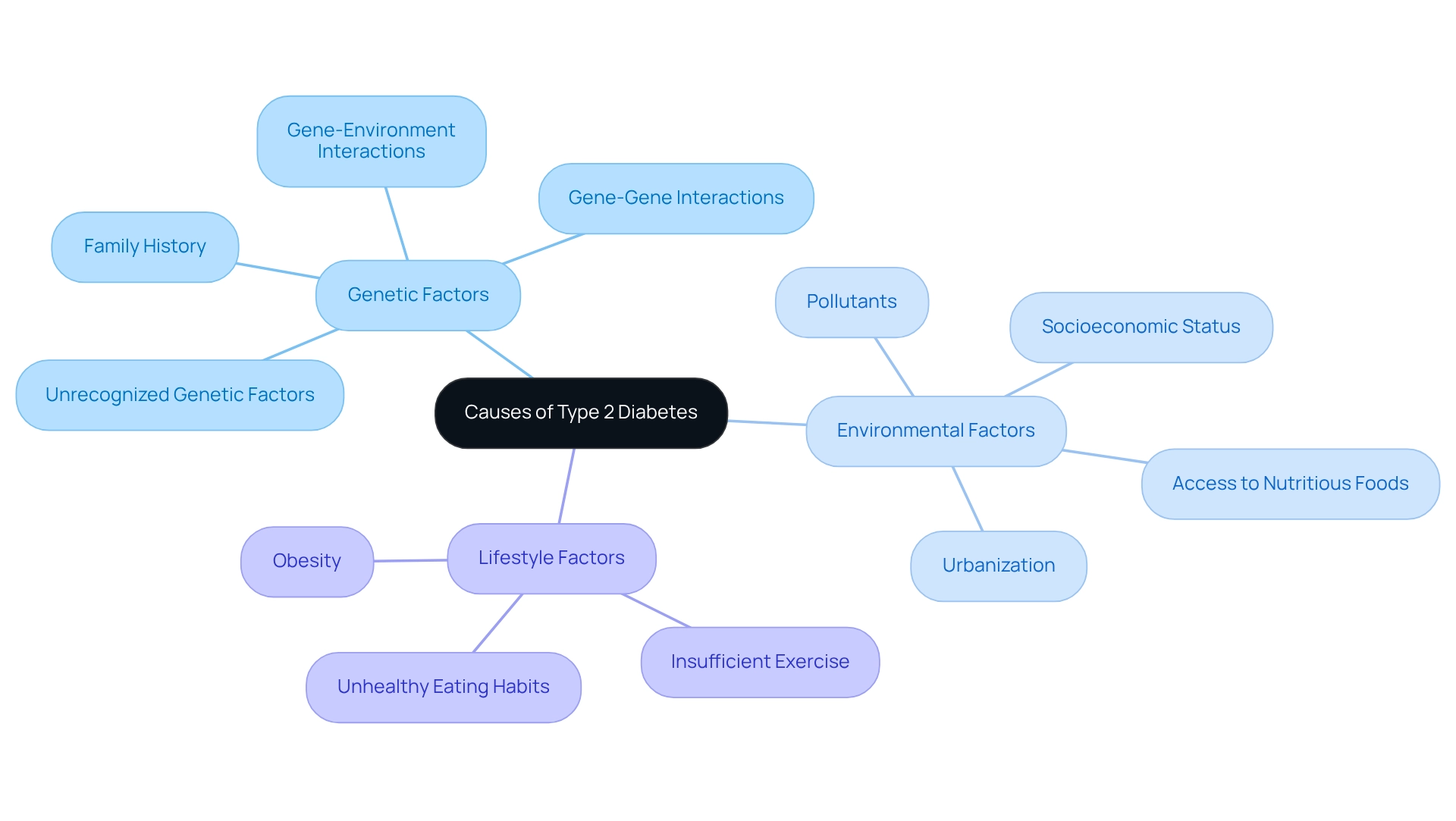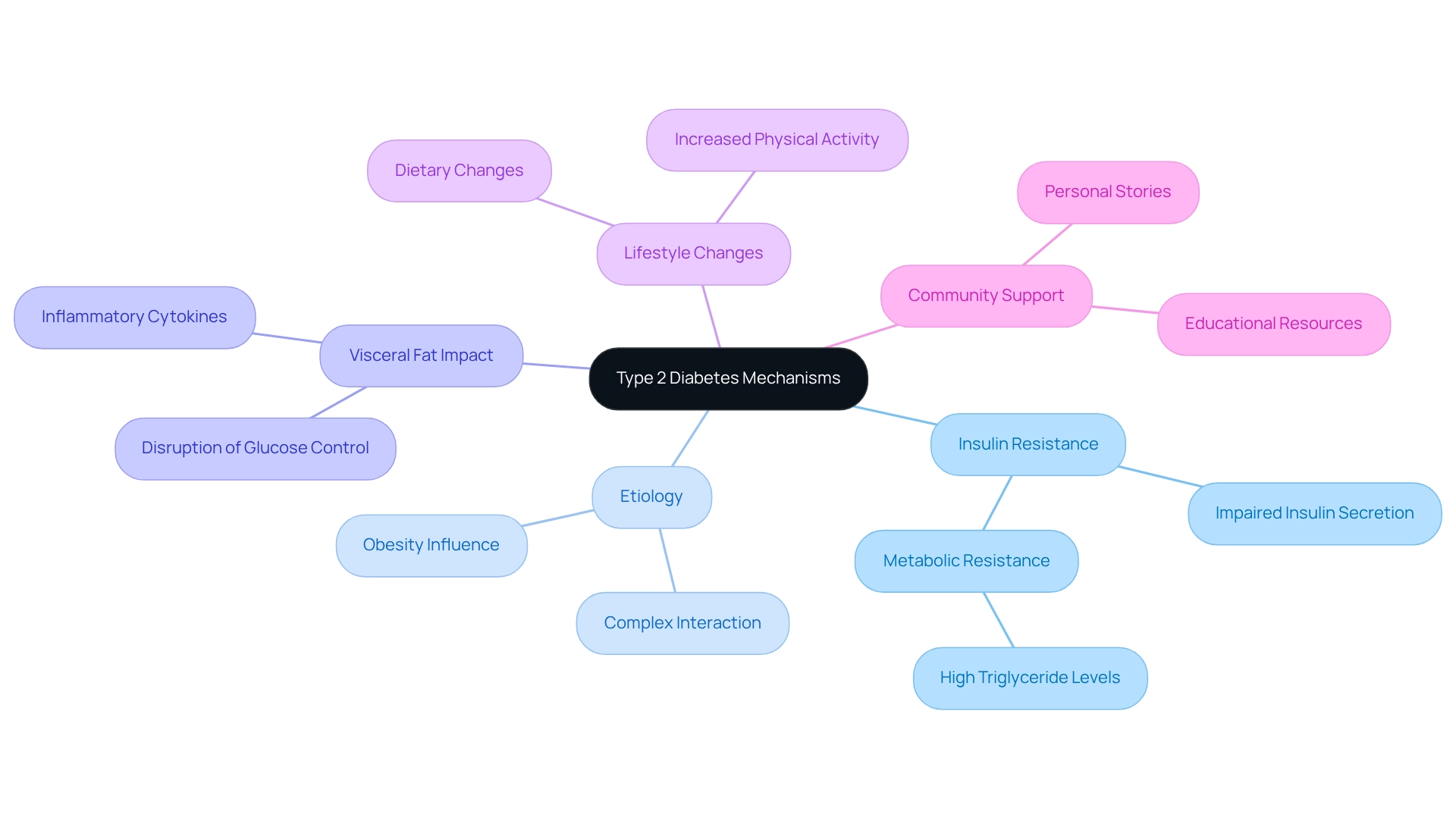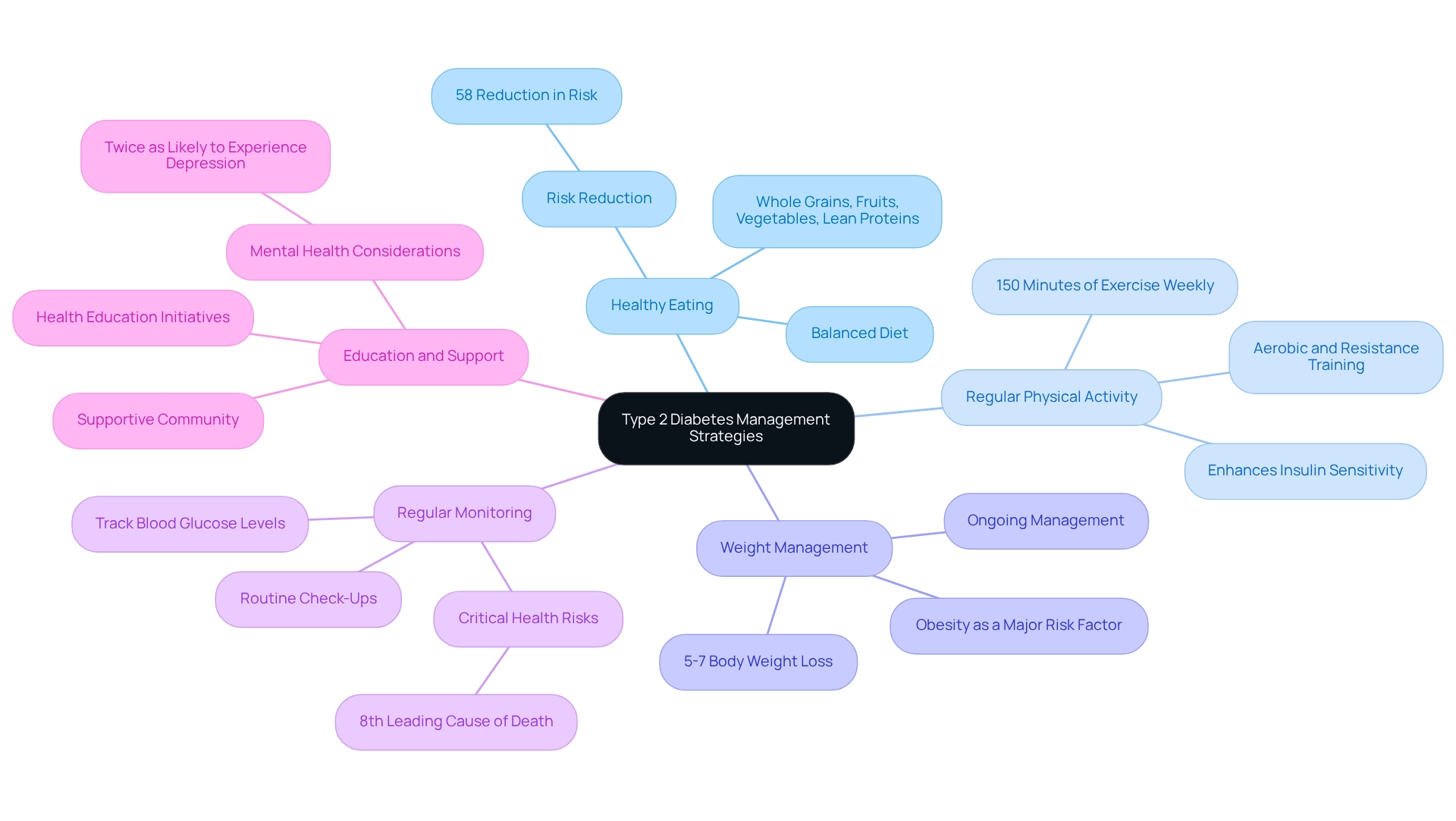Overview
This article delves into the causes and mechanisms of Type 2 Diabetes, highlighting how its origins stem from a complex interplay of genetic, environmental, and lifestyle factors. It's understandable to feel overwhelmed by this information, but let's break it down together.
- Genetic predisposition plays a significant role in your risk for developing Type 2 Diabetes.
- However, it’s important to recognize that environmental influences, such as access to nutritious food, can also impact your health.
- Additionally, lifestyle choices, including diet and exercise, are crucial in managing insulin resistance and reducing the overall risk of this condition.
You’re not alone in this journey. Many people share similar experiences, and understanding these factors can empower you to take control of your health. If you’re seeking support or resources, know that there are communities and professionals ready to help you every step of the way.
Introduction
In a world where chronic health conditions are increasingly prevalent, Type 2 Diabetes Mellitus (T2DM) emerges as a significant public health challenge. This condition, characterized by insulin resistance and the body's struggle to utilize insulin effectively, impacts millions around the globe. It's important to recognize how lifestyle choices and environmental factors intertwine with T2DM, making it a complex issue that deserves our attention.
As the prevalence of T2DM continues to rise, understanding its intricacies becomes essential for effective management and prevention. It's understandable to feel overwhelmed by this information, but know that you are not alone in this journey. This article will explore the multifaceted nature of T2DM, delving into its causes, mechanisms, and strategies for prevention and management.
We are here to support you every step of the way, introducing T2DSolutions as a vital resource for individuals seeking guidance and support on their diabetes journey. Together, we can navigate the challenges and find a path toward better health.
Understand Type 2 Diabetes: Definition and Overview
Type 2 Diabetes Mellitus is a long-lasting metabolic condition characterized by resistance to insulin and a relative lack of this vital hormone. Unlike Type 1 Diabetes, where the body cannot produce insulin, individuals with Type 2 Diabetes can generate it, yet their bodies struggle to utilize it effectively. This inefficiency leads to elevated blood glucose levels, which can result in various health complications if not managed properly. A thorough understanding of the etiology of diabetes type 2 is crucial for effective management and prevention strategies. It impacts millions of people worldwide and is often linked to lifestyle factors such as nutrition and exercise, which play a significant role in the etiology of diabetes type 2. It's understandable to feel overwhelmed by this diagnosis, but you are not alone in this journey.
As T2DSolutions launches as a new resource hub, it aims to provide comprehensive education and community support for newly diagnosed patients. We are here to empower you with the knowledge and tools necessary to manage your condition effectively. Together, we can navigate this path toward better health, ensuring you have the support you need every step of the way.

Explore the Causes of Type 2 Diabetes: Genetics, Environment, and Lifestyle
The etiology of diabetes type 2 is a complex interplay of genetic, environmental, and lifestyle factors. It's important to understand that genetic predisposition plays a significant role, with family history serving as a strong predictor of risk. Recent studies indicate that recognized genetic risk alleles contribute to only about 10% of the heritability seen in type 2 diabetes. This suggests that many genetic factors remain unrecognized, highlighting the need for ongoing research into gene-gene and gene-environment interactions. Such insights could enhance our ability to predict risks and identify those who may be at greater risk.
Environmental factors are also crucial in the development of T2DM. Elements like exposure to pollutants, socioeconomic status, and access to nutritious foods can greatly influence an individual's risk. For instance, communities with limited access to healthy food options often experience higher rates of obesity and related health issues. Additionally, lifestyle choices, such as insufficient exercise and unhealthy eating habits, are significant modifiable risk factors that can be addressed to reduce the likelihood of developing T2DM.
Real-life examples illustrate how environmental factors can affect the risk of this condition. Urban areas with high pollution levels have been linked to increased insulin resistance, while regions that promote active lifestyles and healthy eating show lower prevalence rates. As of 2025, it’s estimated that 252 million people are living with undiagnosed blood sugar conditions, underscoring the urgent need for awareness and education about these risk factors, including the etiology of diabetes type 2. Understanding the complex causes of type 2 metabolic disorders empowers individuals to take proactive steps in managing their health. By recognizing the impacts of genetic predisposition, environmental influences, and lifestyle choices, patients can make informed decisions that may help mitigate their risk of developing this chronic condition. At T2DSolutions, we aim to provide valuable resources and support for those navigating these complexities, fostering a community dedicated to diabetes education and management. Remember, you’re not alone in this journey; we are here to support you every step of the way.

Examine the Mechanisms of Type 2 Diabetes: Pathophysiology and Insulin Resistance
At T2DSolutions, we are dedicated to providing valuable resources for individuals managing Type 2 Diabetes. Understanding the etiology of diabetes type 2 is vital, as it involves a complex interaction of insulin resistance and impaired secretion. The etiology of diabetes type 2 is often linked to the body's cells becoming less sensitive to insulin, which can lead to rising blood glucose levels, frequently influenced by obesity.
The accumulation of visceral fat is linked to the etiology of diabetes type 2, as it releases inflammatory cytokines that disrupt glucose control pathways. Research indicates that high triglyceride levels, defined as 150 mg/dL or above, are frequently associated with metabolic resistance, complicating the overall metabolic landscape. As resistance progresses, pancreatic beta cells may struggle to produce enough insulin, which underscores the importance of understanding the etiology of diabetes type 2 for effective interventions.
Recent studies emphasize the crucial role of lifestyle adjustments, such as dietary changes and increased physical activity, in managing glucose resistance. At T2DSolutions, we aim to support newly diagnosed patients by offering educational resources and community support to help implement these lifestyle changes.
Real-life examples illustrate how obesity can negatively affect glucose signaling and contribute to the etiology of diabetes type 2, while current statistics reveal that a significant percentage of individuals with Type 2 Diabetes experience varying levels of glucose resistance, highlighting the need for targeted strategies. Experts suggest that a comprehensive approach, combining medical and lifestyle interventions, is essential for enhancing insulin sensitivity and improving health outcomes. By deepening our understanding of these mechanisms, you can navigate your health journey more effectively.
We encourage you to share your personal stories and experiences in managing diabetes. This creates a supportive community for those facing similar challenges, reminding you that you are not alone in this journey. Together, we can foster a sense of connection and encouragement as we navigate the complexities of Type 2 Diabetes.

Apply Knowledge of Etiology: Prevention and Management Strategies for Type 2 Diabetes
Preventing and managing Type 2 Diabetes is a journey that requires a multifaceted approach, one that embraces lifestyle modifications, consistent monitoring, and appropriate medical interventions. It’s understandable to feel overwhelmed, but effective strategies can truly make a difference:
-
Healthy Eating: Emphasizing a balanced diet rich in whole grains, fruits, vegetables, and lean proteins is crucial for managing blood sugar levels. Research shows that making dietary changes can lead to significant improvements in glycemic control. In fact, individuals who adhere to a healthy eating plan can reduce their risk of developing Type 2 Diabetes by up to 58%.
-
Regular Physical Activity: Engaging in at least 150 minutes of moderate exercise each week not only enhances insulin sensitivity but also supports weight management. Current guidelines recommend incorporating both aerobic and resistance training to maximize these benefits.
-
Weight Management: Even modest weight loss—around 5-7% of body weight—can dramatically lower the risk of developing Type 2 Diabetes. This is especially important, considering that obesity is a major risk factor. Recent findings emphasize the ongoing nature of obesity management and its impact on diabetes-related issues.
-
Regular Monitoring: Consistent tracking of blood glucose levels and routine check-ups with healthcare providers are essential. This proactive approach facilitates early detection and effective management of the condition. Remember, Type 2 Diabetes was the eighth leading cause of death in the United States in 2021, underscoring the critical need for vigilant monitoring.
-
Education and Support: Participating in health education initiatives equips individuals with the essential knowledge and skills for effective self-management. These programs not only provide vital information but also create a supportive community, which is crucial for emotional well-being. Individuals with diabetes are twice as likely to experience depression compared to those without the condition, so having a support network is invaluable.
By implementing these strategies, you can significantly improve your health outcomes and quality of life while effectively managing Type 2 Diabetes. Remember, you're not alone in this journey; we are here to support you every step of the way.

Conclusion
Understanding Type 2 Diabetes Mellitus (T2DM) is crucial for effective management and prevention, especially as its prevalence continues to rise worldwide. This chronic metabolic disorder is shaped by a complex interplay of genetic, environmental, and lifestyle factors. Recognizing the importance of these elements allows individuals to make informed decisions about their health, empowering them to take proactive steps in reducing their risk.
The mechanisms underlying T2DM, particularly insulin resistance and impaired insulin secretion, highlight the necessity for comprehensive approaches to prevention and management. Lifestyle modifications—like adopting a balanced diet, engaging in regular physical activity, and maintaining a healthy weight—can significantly improve health outcomes. Regular monitoring and education further empower individuals to navigate their diabetes journey with confidence, fostering a sense of community and support.
As T2DSolutions emerges as a vital resource for those affected by T2DM, it underscores the significance of education, community support, and proactive management strategies. Together, these elements create a roadmap toward better health, enabling individuals to not only manage their condition but also enhance their overall quality of life. In the face of this public health challenge, collective efforts and informed choices can pave the way for a healthier future. You're not alone in this journey; we are here to support you every step of the way.
Frequently Asked Questions
What is Type 2 Diabetes Mellitus?
Type 2 Diabetes Mellitus is a long-lasting metabolic condition characterized by insulin resistance and a relative deficiency of insulin, leading to elevated blood glucose levels.
How does Type 2 Diabetes differ from Type 1 Diabetes?
Unlike Type 1 Diabetes, where the body cannot produce insulin, individuals with Type 2 Diabetes can produce insulin but struggle to use it effectively.
What are the potential health complications of unmanaged Type 2 Diabetes?
If not managed properly, Type 2 Diabetes can lead to various health complications, including cardiovascular disease, nerve damage, and kidney issues.
What factors contribute to the development of Type 2 Diabetes?
Type 2 Diabetes is often linked to lifestyle factors such as nutrition and exercise, which play a significant role in its etiology.
What resources does T2DSolutions provide for newly diagnosed patients?
T2DSolutions serves as a resource hub offering comprehensive education and community support to empower newly diagnosed patients in managing their condition effectively.
How can individuals manage their Type 2 Diabetes?
Effective management of Type 2 Diabetes involves understanding the condition, making lifestyle changes, and utilizing available resources for support and education.



